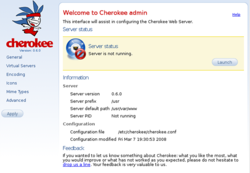| Cherokee Web Server | |
|---|---|
 | |
 | |
| Original authors | Álvaro López Ortega, Cherokee Project |
| Stable release | 1.2.104 [1] / 1 April 2014 |
| Repository | |
| Written in | C, Python and JavaScript [2] |
| Operating system | Cross-platform [3] |
| Available in | English, Spanish, German, French, Italian, Dutch, Polish, Swedish, Brazilian Portuguese, Chinese Simplified, Catalan, Galician |
| Type | Web server |
| License | GPLv2 [4] |
| Website | cherokee-project |
Cherokee is an open-source, cross-platform, web server that runs on Linux, BSD variants, Solaris, OS X , and Windows. It is a lightweight, [5] high-performance [6] web server/reverse proxy licensed under the GNU General Public License. Its goal is to be fast and fully functional yet still light. Major features of Cherokee include a graphical administration interface named cherokee-admin, and a modular light-weight design.
Contents
- Features
- Web server features
- Web applications
- Devices running Cherokee
- See also
- References
- External links
Cherokee is maintained and developed by an open source community. [7]